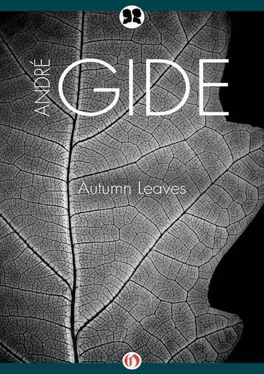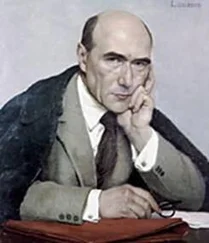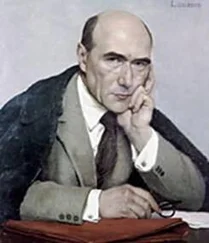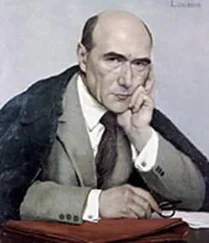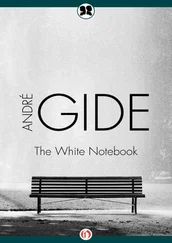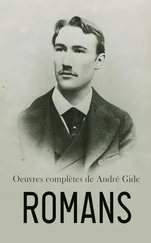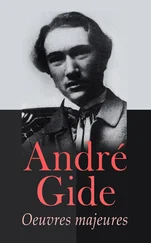I did not read, at that early period of my life, all of the Second part of Faust, but better yet Faust’s monologue on his awakening amidst an exultant nature, those lines in which the participation of the outer world appears so active that I understood immediately, to the point of embarrassment, that up to that moment (I was eighteen years old), I had only opened my soul to God; I understood He could speak to me through my senses, if the screen of books was not interposed between nature and me, and if I permitted a direct and permanent contact, a physical communion, to be established between my being and the whole of the surrounding universe.
I also read Helen’s monologue:
Bewundert viel und viel gescholten …
How many times I repeated those words later on, exulting in that persuasion that the admiration of another goes hand in hand with blame, that one can not deserve praise without also provoking insult, and that he does not truly love the laurel who does not also love its bitterness.
My memory of the first reading of Torquato Tasso, which I made not long after, remains inseparable from Schopenhauer. The World as Will and Idea dug a metaphysical pit under the replies in the dialogue between the poet and the man of action. It is of no importance whether Goethe himself was conscious of that deep significance or not. Is it not the property of a perfect work of art to permit of more being seen in it than the artist planned to put into it? In that dialogue two universes confront each other; action opposes the dream and pure contemplation.… And I loved to find time and time again in the whole life of Goethe, those antagonisms that he maintained knowingly within him, which invited him to find satisfaction only in the struggle, and not to seek repose, not to admit there was any other than the one found in death. And it was because he knew that:
On all the summits, repose
and because he did not want repose but struggle that he preferred, to the superhuman summits of the sublime both in art and in his life, the sunny slopes where grow the grain and vine, that should nourish man and that may intoxicate him.
For nothing is more treacherously untrue of Goethe’s image than the serene picture that is commonly painted of him (in France at least). That sort of superior felicity where he maintains himself impassible and smiling in a region inaccessible to storms, is not his. His Spinozism does not go so far as to try to separate him from the passions that the Ethics helped him to understand better. On the contrary, at first he abandons himself to all of them, knowing how to learn from them, and only seeks to free himself when he has nothing more to learn from them. His aim, if he had any other than that of simply living as fully as possible, was culture, not happiness. That is what Michel Arnaud demonstrated excellently, in the pages he published in 1900 and 1901 in l’Ermitage under the title: The Wisdom of Goethe. I have just reread those pages; it seems to me that no one has since written anything more reasonable on Goethe, or anything better. Doubtless the conversations I had at that time with Michel Arnaud helped me to penetrate still further into the hidden recesses of the one toward whom so many natural affinities inclined me. But is it right to speak here of influence? If I allowed myself to be taught so willingly by Goethe, it was because he taught me about myself. And if I make a pun out of the word Recognition, it is because I recognize him in me constantly: each thought I could have, if not born of him, at least gained confidence from him. He did not turn me from my way, and in order to meet him, I did not turn aside from myself. The reading I did from his work blazed the trail of my existence. I have come across a copy of Dichtung und Wahrheit in which, along the margin of the considerations on the history of the Hebrew people (Book IV) I wrote in pencil: “This whole passage admirable. I read it in the casino at Biskra on February 27, 1895” … And I confess that, on rereading it to-day, however fine that passage still seems to me, I don’t understand very well any more what pleased me so much in it at that time. It is certain that, on that day when I felt the need of going into detail, I had a sort of revelation. Perhaps I had simply found out how to absorb new confidence from that thought so simple and so simply expressed: “Der Mensch mag sich wenden, wohim er will, er mag unternehmen, was es auch sei, stets wird er auf jenen Weg wieder zurückkehren, den ihm die Natur einmal vorgezeichnet hat.” 1Yes, it was especially that which Goethe gave to me: confidence. And, in the diary which I kept at that time, I read at about the same date: “Nothing will have given me more assurance in life than the contemplation of the great figure of Goethe.” I had also to free myself from the trammels of a Puritan morality that, for a time, had been well able to stiffen me and teach me resistance, but of which I now felt only the resistance and embarrassment, with the result that, the force of resistance which it had given me I was resolved to use against that very morality. Nothing was better calculated to help me than the reading of the Roman Elegies. I was delighted to understand them so well. I memorized whole passages of them and recited them to myself all day long; they scanned the rapid beating on my eager heart. I never tired of wondering at the legitimacy of pleasure with the astonishment of someone who, up to that day, had stumbled everywhere against prohibitions and forbidden things. What impunity! What freedom! I was to make a part of me that tranquil and harmonious blossoming in joy. And that nothing was more powerfully opposed to the Christian ideal is what the zealous defenders of the Church did not fail to perceive. It amused me to see them deny that Goethe had talent, the gift of persuasion or eloquence, when the glorious example of his life was enough to convince me that he had not lost his way, and that only those in France could deny the splendor of his writings, who did not read them in his language, but only in a disillusioning translation. However the denial that I was not surprised to see them register in respect to Goethe, I was pleased not to note in Goethe as regards them. It was natural they should not be able to accept the ethics of Goethe. It was natural that Goethe, anxious to admit everything, to understand everything, should write in speaking of them: “It is generally clear that others have just as much right to exist in their way of life, as I in mine.” 1Thus culture accepts Catholicism as a fertile stage in humanism, of that humanism which religious faith must oppose.
Yet I confess that this forebearance of Goethe’s seems to me today somewhat compromising. As long as he opens his mind and heart through great need to understand everything, it is all right; but if it is through concern for tranquillity and comfort, that is what augments accordingly, in my eyes, the cutting attitude of Nietzsche.
It is not a matter of indifference that Germany alone produced these two great representatives of humanity. Goethe was necessary for Nietzsche to raise himself, not against him, but on him. When I reread Goethe, I see Nietzsche in him already in full strength. You don’t have to squeeze Faust very hard to have the superman spout out; in The Gods, The Heroes of Wieland, I have a presentiment of The Birth of the Tragedy; and lastly, in his Prometheus (I am not speaking only of the Ode that figures also in the volume of his Poetry, but of the little drama to which, a little artificially, he later attached this monologue 1), I learned then that nothing great was attempted by man, except in revolt against the gods. None of Goethe’s work exercises my mind more deeply, and that too is because his boldness is so extreme; that is why Goethe could not make up his mind easily, and then only toward the end of his life, to publish that youthful writing. Even the Ode he attached was given to the public without his consent. Here, as though in spite of himself, Goethe joins Nietzsche, or rather precedes him. But as to the state of insubordination that he paints in his Prometheus, Goethe is neither able nor does he wish to maintain it; he has got to return, on leaving the region of the thunder, to a climate where his thought can blossom more comfortably. He who was to attempt in the Second part of Faust a reconciliation between Faust and God by means of a dangerous Christian symbolism, desired, in a spirit of pacifism, to reconcile even with the divinities of Olympus the Titan at first in revolt. The sentence he adds to the monologue: “Minerva tritt auf, nochmals eine Vermittelung einleitend” (Minerva arrives for a new attempt at mediation) makes it sufficiently clear. And his not being able to succeed in finding a satisfactory formula for the reconciliation, or his coming to regard that reconciliation as impossible or vain, is what explains the interruption of that work about which Goethe had, nevertheless, scarcely ceased to think, for it symbolized and resumed admirably the torment of his own mind. I will say more: that peace that he attained in his life, he was doubtless only able to obtain by cheating a little; he could not consent to trickery in a work of art; so it remained incomplete.
Читать дальше
